By Petra Wall
Norm Morrell
Norman Morrell’s love of teaching is readily apparent from his philosophy of fairness, sensitivity and inclusion, starting with his experiences in the one-room schoolhouse where he began his career at age 18 to Manitoulin Secondary School where he both taught and counselled his teenage students towards success. He retired from MSS as vice principal. “Conciliatory discipline trumps a power struggle. Kids must be led, not driven. They need alternatives to make good choices,” Norm explains. “We offered a path to confidence rather than punishment.” Students often left the office shaking his hand. “If we find ourselves at the top of the hill and the only way forward is down, we can still choose our path. We are the architects of our own lives, and armed with Christian values, we can make the best of the journey. There will always be better days ahead.”
Norm’s paternal ancestors, protestant Huguenots, originally moved from France to England. Part of the family moved to present day Long Island, New York in 1643. After the War of Independence, Norm’s United Empire Loyalist ancestors moved to the Woodstock area of New Brunswick, and finally to Hanover-Walkerton area in Southwestern Ontario. Great grandfather Foster Morrell was a sawyer. He arrived to Manitoulin from Hanover-Walkerton with his second wife in 1873. They settled on a farm off Hwy 540, in Gordon Township, two farms east of where Pat Noble Lumber is located today.
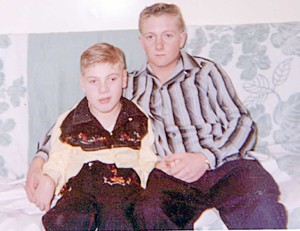
Grandfather Ammon and Ellen (Neely) Morrell bought 500 acres, ‘Indian Hill,’ from land originally belonging to the Obejewong Reserve near present day Evansville. The people from the reserve moved to Sagamok, West Bay and Sheshegwaning. The maternal line, the Van Horns, hailed from Holland, moving to Pennsylvania, then Markham and finally to Spring Bay on Manitoulin. Grandfather Norman Van Horn bought a farm in Burpee. Grandmother Grace Head, of English ancestry, was born in Spring Bay.
Norm’s father, Leonard worked in the Levac Mine in Sudbury from 1939 to 1942, helping with the war effort. In 1942, he and Viola (nee Van Horn) moved back to the farm on Manitoulin where Norm was born on August 5, 1942 in the Wright Family house, next to the doctor, in Gore Bay. Brothers Austin and Russell were added to the family later. For the next nine years, the Morrells lived in the original log cabin at Indian Hill on 250 acres that Leonard had inherited.
“I remember living in the old log cabin on top of the hill. It was taken down in the 1980s. A few years ago, Jacquie Gordon gifted me with a precious painting of the cabin. Coal oil lanterns and an outhouse were standard accoutrements. Hydro crossed the causeway in 1949 to our farm first. Griffith’s, Elmer Harris and Northernaire Lodge were next. I was seven when we put up the first yard light.”
The mail bus had to get from Meldrum Bay to Gore Bay so Hwy 540 was plowed daily in the winter. “Back roads weren’t plowed until the late 1940s so we got our mail by horse and sleigh. I remember seeing the distant but familiar sight of the horses coming closer, the sleigh made more distinct by the smoking stove pipe sticking out of the wooden box on top. You still had time before you went out to get the mail.”
“My dad always had race horses pulling the farm wagon. He liked them best, but he didn’t race them. I remember, at five, helping my dad pull rocks off the field. I sat on the wagon while he stacked the rocks on the loose slats covering the bottom of the hay wagon. He had just jumped down when something spooked the horses and they began to run. I hung onto the slats for dear life, even though some of them were falling off and rocks with them. My father was racing to catch up. Thankfully the horses stopped at the gate and I survived my ordeal.”
Haying could be a challenge too. “I would stand at the front of the hay wagon behind a slatted upright hay rack and direct the horses, their reins (or ‘lines’) held just behind the rack. Occasionally, a horse would jerk his head up and painfully force my fingers through those narrow gaps, so I tried hard not to annoy the horses.”
“Our first family car was an old Model A with a rag top and vinyl windows. In the winter, the vinyl would crack and flap about in the wind. Buffalo robes compensated for the lack of heat. Our next car was a 1939 Ford with suicide doors, doors that were hinged at the back. They could open in the wind and a passenger might fly out. That happened to my brother. He opened the back door and got dragged out but he was alright. Thankfully, Ford soon discontinued these suicide doors. In I951 we got a new Chevrolet, one of the first in this area.”
“Corduroy roads were the norm. Cedar logs were laid across the roadway, and these old roads serviced horses and buggies, quite well. After the frost lifted in May, a muddy quagmire made travelling by car difficult. In time, the corduroy was dug up and replaced by gravel. Our local gas station serviced the cars. It was run by Ritch and Mabel Harper with a generator in the shed, big round globe lights and gravity fed gas pumps.”
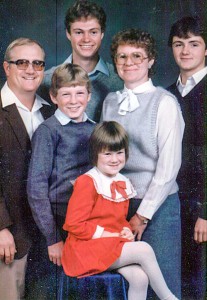
Norm started school at No. 3, Burpee Mills’ one-room school, after the Easter Holidays in 1949, walking the two miles with a neighbour’s son. His first teacher was Nelda Hembruff, 19, from Manitowaning. “I remember flipping up the top of my desk and finding a pad of perforated paper for art class. I didn’t really like art. I liked math and reading the best.” Other teachers were: Jennie McCulligh for Grade 1, Isobel McDonald for Grade 2 through 7 and Marnie Wood in Grade 8.
Nelda Hembruff left teaching to become a nurse. She returned to Manitowaning. “I saw Nelda again late in her life. I didn’t realize she lived on Lake Manitou. Bill Caesar tried to get her to my retirement party in 1996. She couldn’t make it but she asked Bill to have me contact her. It was exciting to meet her again and talk of those early school days.”
“Old Jim Nesbitt, in his 70s, would often walk with us to school on his way to his nephew’s place. He liked to tease us a little and occasionally race with us. He did well for his age and we liked spending time with him. I remember him joking about the hay wagon with its slats and gaps. ‘Ok, I’m on the wagon, but where are the snow shoes to keep me from falling through?’ We laughed.”
Softball was the game of choice in elementary school. “Lorne Baker would bring his tractor and hay-wagon to transport all 30 kids, both players and supporters, from the school to each game. He would put the tractor into overdrive to get us there on time. This was the era before liability insurance was a pre-requisite.”
In 1954, the townships got a school bus that went from Meldrum Bay to Gore Bay. “Our driver, Len Bailey, was terrific. His jokes made the trip fun.” Norm, 13, the youngest on the bus, was picked up right in front of his home. Without the bus, Norm would not have been able to attend high school in Gore Bay because he would have had to board in town, an expensive option.
“The high school years were the best years of my young life. There were 57 kids in Grade 9 in two classes, out of 180 kids in all. Only seven of those Grade 9 kids in my class were girls. We learned how to ‘shake the tree’, get things going, have fun, but still do the work. In typing we got the teacher running in circles when we conspired to have the spring-loaded carriage shoot continuously across the typewriter, making that loud distinctive noise. In another class, you could make the windows rattle if you ‘discreetly’ jumped up and down, annoying those in charge. Oddly enough, that teacher couldn’t figure out what was making the windows rattle.”

“We had one hour and 15 minutes for lunch. There was a pool hall in between the two schools. We played there or we would move around from one restaurant to another, sometimes with our home-made lunches in tow. Freedom from rules made it all exciting.”
Classes alternated between the old municipal building and the top of the current nursing home (the former site of Charles C. McLean School in Gore Bay). The younger kids shared the space with us. Teachers and principals rotated to each location. In 1959, we used the C.C. McLean Public School building for our high school classes. Uncle Roy was my academic hero. He was the first in our family to finish Grade 12. He taught for a while, but then went back to farming.”
“Ball games in high school had us carpooling. We would take our own cars and drive all over Manitoulin. Gore Bay High School won the championship for all the high schools for many years. We also played American style fastball (with underhand pitching) in Evansville with an older group of guys and won first place in that league in 1959.”
In 1960 Norm, 17, attended summer school for teacher’s training so he could instruct elementary school the following year. “In 1961-62, I taught at No. 4, Gordon Township, a one-room school on the seventh line. The following year, in 1962 to 1963, I attended teacher’s college in North Bay. I taught in Garson for one year but I couldn’t get used to the treeless landscape so made plans to move south.” However, in the fall of 1964, Norm got the job of principal at the Mindemoya Public School and he moved back to the Island instead. He was soon involved with minor hockey, inter-elementary ball and broomball. Norm started the first elementary track and field event in the spring of 1965.
Norm met Joyce Cosby at a dance in Spring Bay. She was working at Gordon’s Lodge. “She was a quiet, shy, farm girl from Green Bay. She was the opposite of me,” Norm shares, smiling, “but there was chemistry operating for both of us.” Norm was the principal in Mindemoya at the time. In due course, the two decided to marry and a small family wedding was held on Friday, December 8, 1967. The newlyweds went to Sault Ste. Marie for their honeymoon. “It was a short trip but we have been on many honeymoons since then. We have seen both Canadian coasts, Alaska, Europe, Hawaii, the Caribbean and much of the States.”
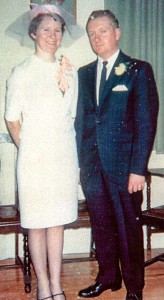
wedding.
The couple had four children, Larry, Roger, Craig and Anne. “Anne has two children. She became a teacher for the Kitchener-Waterloo board. We often share stories about our time together at MSS. Larry and Roger both played ball and hockey. Larry has a BSc in Nursing from Laurentian and he works for Perth County District Health. He has two children. Roger has a BSc in chemistry and math from Laurentian. He is an air traffic controller at Pearson International. He also has two offspring. Craig was a runner and hockey player. He lives in Rochester, New York. He has a Doctorate from Tufts, and a PhD in Medical research from Johns Hopkins. He is a professor of Medical Research and Cardiology at the University of Rochester in New York. He has two children.”
Norm stayed in Mindemoya until 1967, when he began to contemplate teaching high school. The chair of the Gore Bay High School Board, D. A. McQuarrie, asked him if he had considered advanced teaching. “Yes” Norm responded. He had earned a BA from Laurentian University which included majors in History, Geography and Philosophy. Conceptualization and abstract reasoning, part of philosophy, would be important attributes for his teaching career. He was accepted as a history and social sciences instructor at his old Alma Mater in 1969, going on to Manitoulin Secondary School when it opened for the 1969-1970 school year.
The MSS new teacher had first met Norm and Terry Addison while he was a senior in public school, and they were newer entries. “I think I met you in school before,” one of them joked. Norm also saw some of the kids he had taught at No. 4 Gordon. Before long, Norm noticed some kids struggling with the academic load, so he helped start and head a Special Education Department. “I spent a lot of time in the remedial room, working one-on-one with the kids.” Norm continued his education with a certificate in Co-op Education and Special Ed training in Toronto.
At age 34, Norm began to consider an additional line of work. As a child, he had spent a lot of time at cattle auctions and sales barns in Little Current. He began to practice the auctioneer’s call on his couch at home. His first auction was at the United Church at Elizabeth Bay, then came Ernie’s second hand store where he auctioned off surplus items. By the spring of 1979, Norm was officially in the auction business. At the same time, he was also completing ‘principal school’ so he could take on that role. “Overall, I spent 16 years in summer school or night school.”
In the late 1970s, Norm was asked to take over MSS student activities which included fundraising. At first he wondered if this department really belonged in a high school setting, but then he decided to give it a year. “I worked with Margo Bickell, who was in charge of physical education, and together we improved the student council’s financial status. After a year, I found that student activities was a rewarding field. Again previous employment had helped.” Norm also began to coach the hockey team after being asked to take on the role by one of its members.
“Roy Eaton was a great principal to work for. We got along very well. Bill Caesar, Mel Lewis, Liz Corbiere and other teachers helped make the MSS years very rewarding too. Most teachers can achieve so much if supported by administration, and we were. It was a privilege to work with the students and staff of MSS. Working alongside Anishinabe teachers and students helped me gain new cultural appreciation. I also enjoyed my years with all the other principals: Gwynn Davies, Wilf Pogue and Gary Chandler. Gary and I now hang out in Florida.”
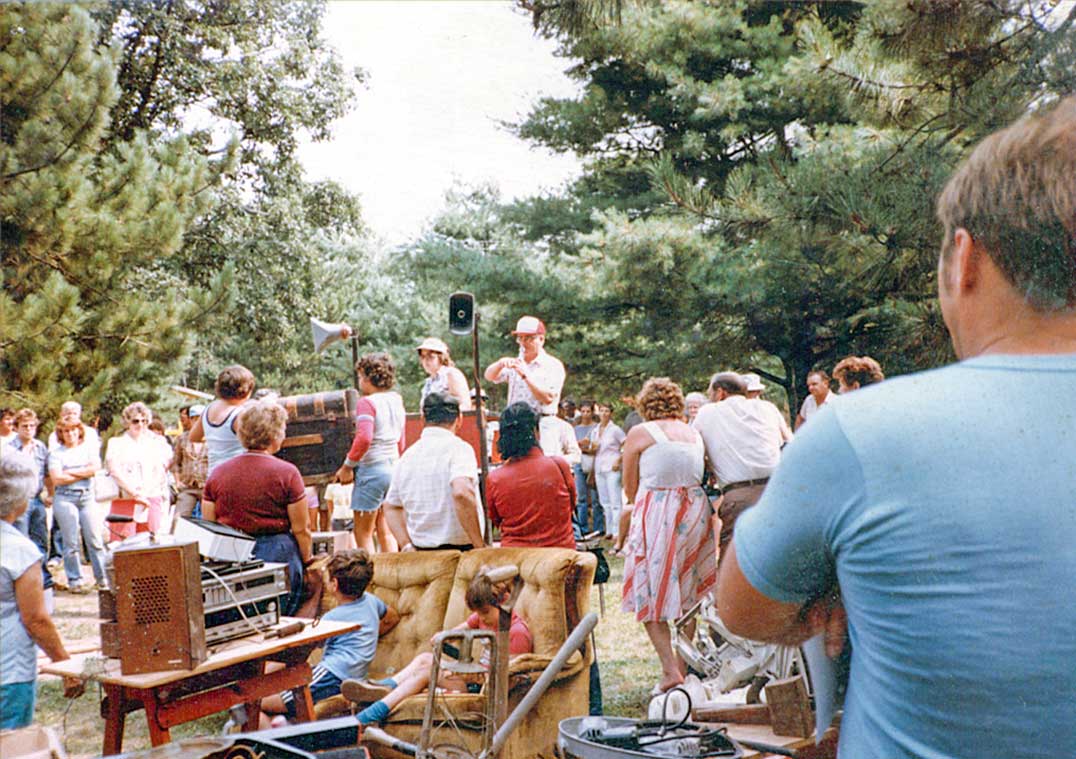
After 1960, drugs had become part of the equation for high school kids. They were reluctant to talk about their issues but Norm discovered they would write about their problems. This strategy proved very helpful for the students and the school. Norm also found teachers were very supportive of his initiatives.
Norm retired from MSS as vice principal in 1996. He had added discipline to his roles in his last year. He became a protector from external forces. About five percent of the student body were involved here. “I didn’t put up with much. I realized the students were smart and I treated them with respect. If they ultimately decided school just wasn’t for them, I offered choices including co-op placements. I always involved the parents.” It was never a power struggle for Norm.
In 1996, our entrepreneur began to sell real estate with Peter Flannagan. On the plus side, he had his winters off, but overall this line of work was less satisfying because there was little interaction with the buyers and sellers. He found that people generally didn’t remember that he had been part of the sale, but the kids he had taught all remembered him.
Norm became a charter member of the Western Manitoulin Lions Club. Two years ago the Rotary Club gave him the Paul Harris Fellow award for fundraising. Norm also got a government award from the Providence Bay Fair Board and a Community Service award in the early 2000s.
“Looking back, I wouldn’t have given up those early years, riding hay-wagons, the one-room school, coal oil lights, penny candy, and even outhouses, for anything. They were special years, enhanced by innocence and free-will. Gore Bay High School was a special place for many of us. We also had a great time at the 40th anniversary of the closing of the old high schools.”
“My brother Russell died in 1996 but he had developed a good comprehension of life by then and he had influenced my life. Austin sailed for a few years. He was third mate on the Norisle for a while and later worked for Massey Ferguson. He lives in Brantford with his wife. Our family is very connected. As members pass on, we close ranks and make sure our family bonds stay strong. ‘That is the Morrell way,’ one of our kids claimed. I have four grandsons and four granddaughters. We always get together at Christmas in the south. Roger, an air traffic controller, often works over Christmas so we try to get closer to his place.”
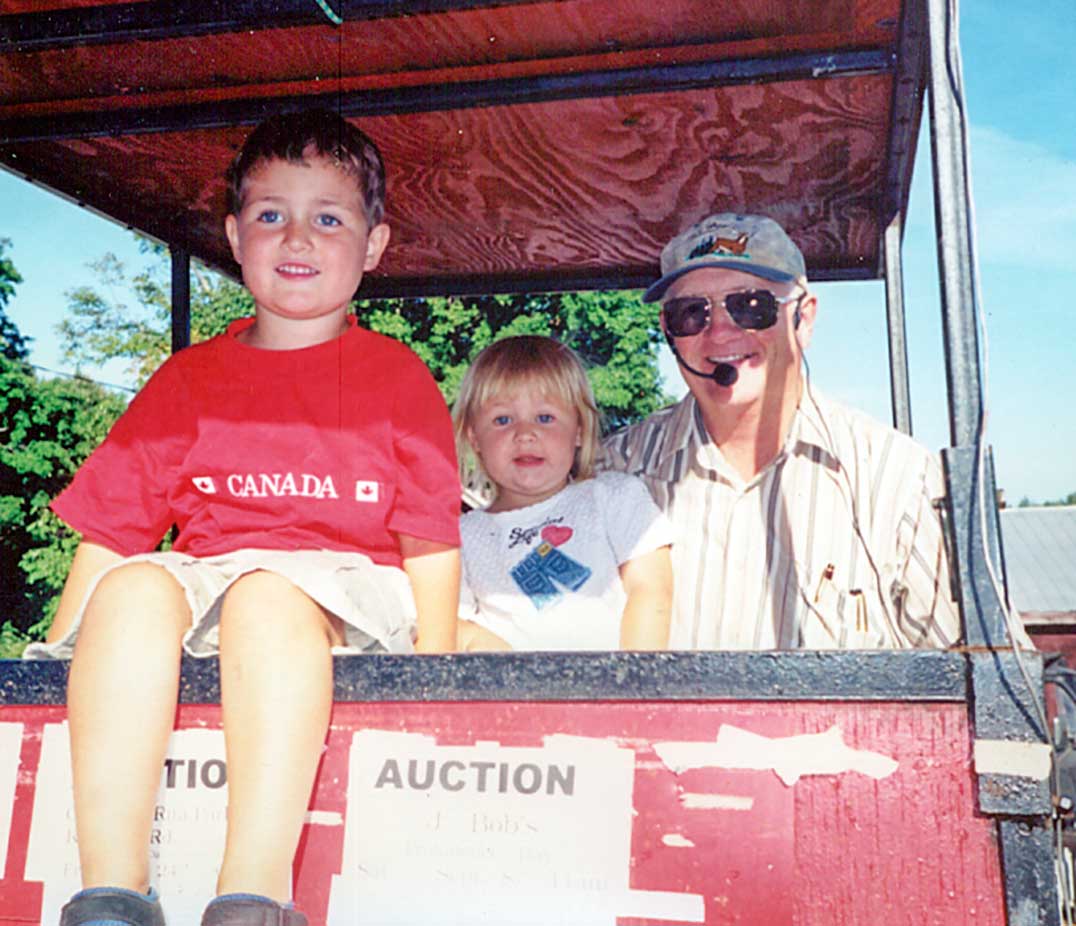
“Going into education is something I have never regretted. It was so very rewarding from beginning to end. I would do it all over again if I had the chance. If I could go back in time, I might have worked a little harder in high school, sacrificing a bit of the fun and I might have gone on to get a Masters of Education degree, but that is behind me now. All my kids started off with a higher education than I wound up with when I retired. However, I am not sure if today’s kids are happier than we were.”
“Our world tends to be divisive today, with much of our wealth polarized at the top. I found poverty is the same creature for black or white. Poverty is non-racist but on Manitoulin rich and poor integrate well,” Norm concludes. “I was born and raised in Western Manitoulin. The kids were happy living here too and they have great affection for MSS and CC McLean Public School. Real people live on Manitoulin, people who think of this Island as their home. Tomorrow, I am off to Little Current to help the Bailey family auction off extra items from the late Doctor Bailey’s home. My life has been very good here. I love Manitoulin. It’s almost heaven and it’s all I ever really wanted.”




